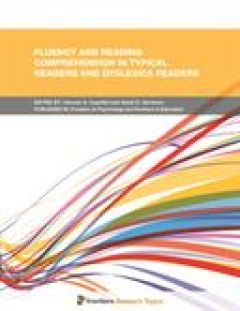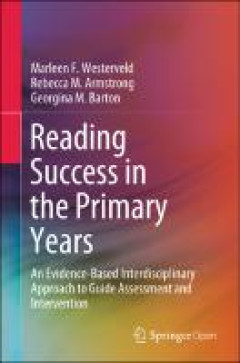Ditapis dengan

Fluency and reading comprehension in typical readers and dyslexics readers
Reading involves decoding and comprehension components and, to become efficient, it requires a large number of cognitive and linguistic processes. Among those, the phonological awareness, the alphabetic principle, the decoding, the fluency, the lexical development and the text comprehension development. The reading comprehension is strongly related with the development of vocabulary, oral langu…
- Edisi
- -
- ISBN/ISSN
- 9782889454150
- Deskripsi Fisik
- 175 p.; 22 cm.
- Judul Seri
- -
- No. Panggil
- 155 CAP f

Understanding developmental dyslexia:linking perceptual and cognitive deficit…
Understanding the mechanisms responsible for developmental dyslexia (DD) is a key challenge for researchers. A large literature, mostly concerned with learning to read in opaque orthographies, emphasizes phono-logical interpretations of the disturbance. Other approaches focused on the visual-per-ceptual aspects of orthographic coding. Recently, this perspective was supported by imaging data sho…
- Edisi
- -
- ISBN/ISSN
- 9782889198641
- Deskripsi Fisik
- 309 p.; 22 cm.
- Judul Seri
- -
- No. Panggil
- 517 UND u

Reading success in the primary years:An evidence-based interdisciplinary appr…
This open access book describes the Reading Success project, in which a 5-step, assessment-to- intervention process, based on the Simple View of Reading, was used within a primary school setting in Australia to better support those students who struggle with reading. It provides an easily accessible overview of each step of the process involved in implementing this approach and highlights the c…
- Edisi
- -
- ISBN/ISSN
- 9789811534928
- Deskripsi Fisik
- xvi, 149p.: ill.
- Judul Seri
- -
- No. Panggil
- 372.4 WES r

Can we read letters? Reflections on fundamental issues in reading and dyslexi…
The authors use these fundamental analyses and definitions to shed new light on the ‘balanced approach to reading instruction’, ‘reading fluency’ and other key concepts. The book also deals with problems in the definition of ‘dyslexia’ and proposes a method to arrive at clear and fruitful definitions. It concludes with a chapter trying to answer the question of in what sense, or to …
- Edisi
- -
- ISBN/ISSN
- 9789462099562
- Deskripsi Fisik
- 148 p.; 22 cm.
- Judul Seri
- -
- No. Panggil
- 371.9144 TON c
 Karya Umum
Karya Umum  Filsafat
Filsafat  Agama
Agama  Ilmu-ilmu Sosial
Ilmu-ilmu Sosial  Bahasa
Bahasa  Ilmu-ilmu Murni
Ilmu-ilmu Murni  Ilmu-ilmu Terapan
Ilmu-ilmu Terapan  Kesenian, Hiburan, dan Olahraga
Kesenian, Hiburan, dan Olahraga  Kesusastraan
Kesusastraan  Geografi dan Sejarah
Geografi dan Sejarah